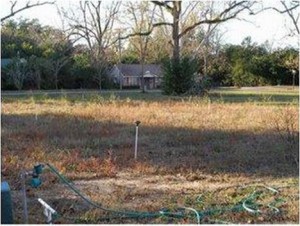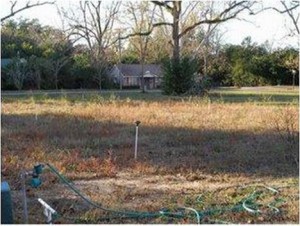Site selection of your vegetable garden is a very important part of vegetable gardening because if the appropriate site is not selected than success may be limited.

Identify distance between vegetable garden and water source. Image of a Walton County Community Garden site in DeFuniak Springs, FL.
Photo Credit: Eddie Powell
First, the gardener should place the garden in a convenient location near the house so it will be easier to maintain. The garden area also needs to be located near a good water source. Second, the gardener needs to determine how well-drained the soil is in the area and make sure that the soil is not compacted. If it is compacted, tilling will be needed to reduce compaction of the soil and help roots reach out into the soil so that optimal nutrient uptake is ensured. Third, the garden needs to be located in an area that receives at least six hours of direct sunlight daily.
Vegetable plants can be added in the landscape with other ornamental plants with proper care. Garden sites along coastal areas are also suitable places for gardens. It is good, when possible, to rotate the garden from place to place to prevent soil diseases and other pests with specific host species from accumulating in one location. One helpful tip for gardeners is to have a vegetable garden plan drawn out including the names of the plants, their location, and the dates they were planted.

Determine how many hours of sunlight is available to the garden. Image of a Walton County Community Garden site in DeFuniak Springs, FL.
Photo Credit: Eddie Powell
Stop by your local University of Florida IFAS extension office to pick up a Vegetable Gardening Guide. It contains the dates for planting vegetables and maturity timeframes. This guide will also help you decide if you prefer ordering seeds or transplanting bought plants. If using transplants, seeds need to be sowed 4 to 6 weeks before the recommended planting date to allow time for adequate growth before transplanting. The vegetable gardening guide also includes a list of plants that do best as transplants and ones that perform better directly seeded. To learn more on this topic please feel free to stop by your local University of Florida / IFAS Extension office or visit http://edis.ifas.ufl.edu/
- Vegetable Garden Insect and Disease Management - June 10, 2015
- Insect Problems in the Heat of Summer - May 8, 2015
- Gardening in a Bucket - April 14, 2015
